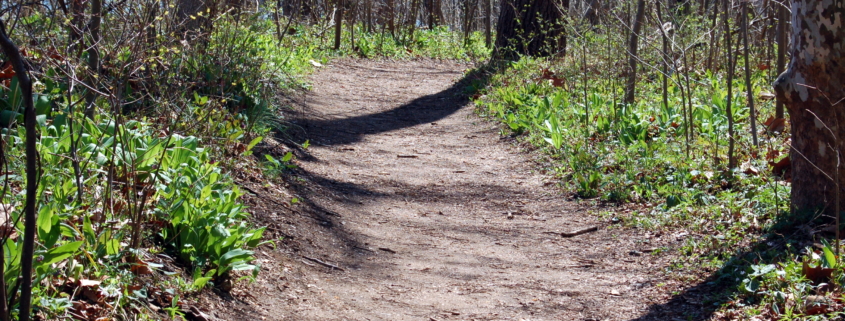Robin Duska: VMN Volunteer of the Year Award
Riverbend; photo by Jerry Nissley
“Of all the paths you take in life, make sure a few of them are dirt.” – John Muir
During the pandemic, the restorative value of walking along dirt paths became especially clear to Fairfax Master Naturalist Robin Duska, who was recently recognized by the Virginia Master Naturalist state board as 2020 Volunteer of the Year for her outstanding contributions to natural resource education, conservation, citizen science, and stewardship.
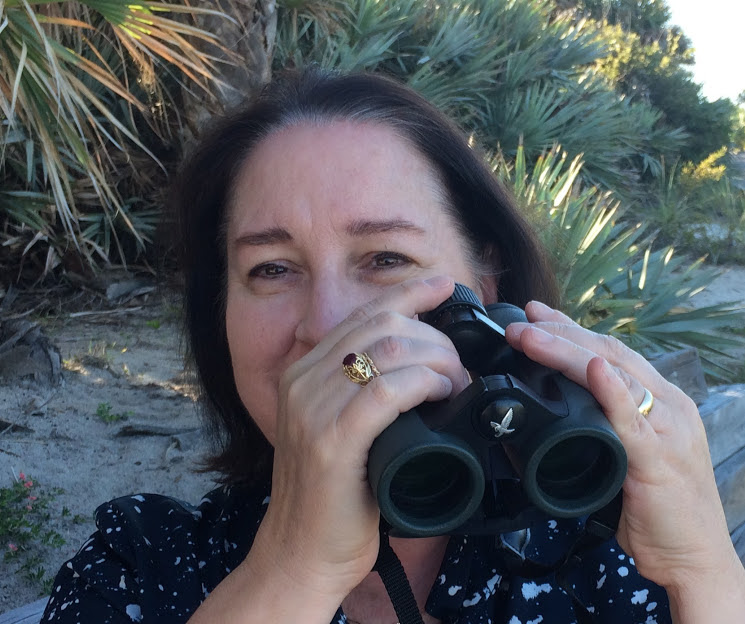
The VMN award announcement identified Robin’s leadership in promoting the creation and conservation of wildlife habitat and in educating the community about the importance of natural, native habitat. When serving as co-director of the Audubon at Home (AAH) program of the Audubon Society of Northern Virginia (ASNV), Robin often went out birding–and eBirding–along the 55 miles of trails near her Reston, Virginia home. “It occurred to me,” she says, “that Reston Association (RA) staff like FMN Claudia Thompson-Deahl were already managing Reston’s natural areas to the standards of the AAH Healthy Yard Pledge one of the requirements for certifying properties as AAH Wildlife Sanctuaries.” It also seemed likely, however, judging from behaviors like littering and letting dogs run off leash, that many Reston residents enjoyed the trails solely for recreation. “Having served with AAH inspired me to highlight the wildlife value of the natural areas in Reston through which the trails meander,” Robin added. As an AAH Ambassador, she got buy-in from AAH and RA to conduct a project to certify natural areas as AAH Wildlife Sanctuaries and then hit the trails to locate AAH Sanctuary Species. After finding 60 Sanctuary Species, she certified six of the natural areas covering 400 acres. “Reston’s Chief Operating Officer Larry Butler signed the applications for certification, and it’s my hope that the AAH certification signage and related publicity will help educate Reston residents about the wildlife habitat value of these wonderful areas,” Robin says.
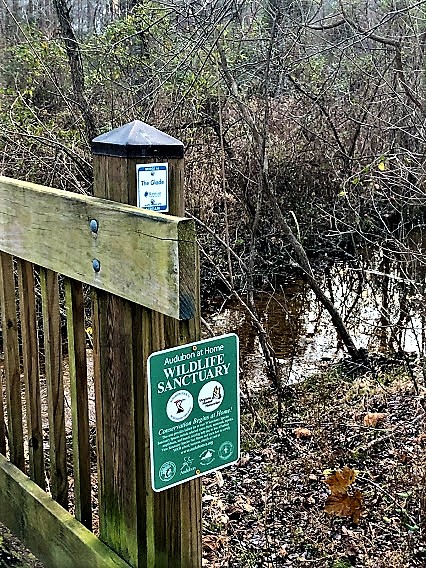
Robin found it possible to manage over 500 hours of volunteer service in 2020 across a variety of activities. She explained, “When I retired five years ago, I decided to structure my volunteering to make some kind of contribution on national, regional, and local levels. During the pandemic, when weekly public bird walks are not being conducted, it has still been possible for me, FMNs Kris Lansing and Janis Stone, and Arlington Master Naturalist Colt Gregory to help out authorities at Great Falls National Park by walking the dirt paths and providing a weekly update on the park’s birds.” She continued by saying, “sadly the pandemic precluded my other usual national-focused volunteering in the National Museum of Natural History’s Bird Division and Q?rius Learning Center—and sadly as well, I didn’t do much traveling in 2020. But on the bright side, that left more time for regional and local service, much of which can be done outside, in writing, or via Zoom.”
On the regional front, out on those dirt paths again in the absence of public bird walks, Robin and FMN Kris Lansing report weekly to park authorities on the bird life at Fairfax County’s Riverbend Park. Also, Zoom became a resource early on: In March, having recruited experts from Pennsylvania Audubon to hold a jointly sponsored RA-ASNV program in Reston, Robin realized that the pandemic would preclude travel from Pennsylvania to Virginia. So, she restructured the program into a webinar—a continuing educational resource about bird-window collisions. In summer, she also facilitated Audubon at Home discussions with parties in Fauquier and Rappahannock Counties to expand AAH operations there–and the pandemic did not prevent drafting and coordinating the requisite documents to clinch the new AAH partnerships.
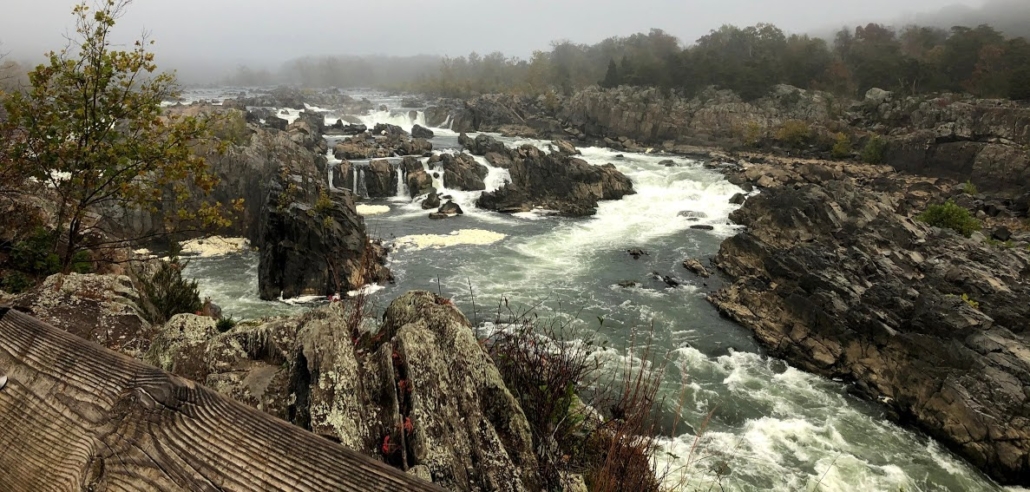
Locally, after a term on Reston’s Environmental Advisory Committee (EAC), Robin has remained involved with its project teams. “Reston is part of the Biophilic Cities Network, and I got to thinking that some residents who want to take action to help the environment might not know what is actually helpful,” she says. Therefore, she conceptualized a pledge and led the 2020 team that refined it and developed a communications plan for the Reston Biophilic Pledge, which asks Reston’s 60,000 residents to commit to specific actions. For the 2020 update of the award-winning Reston Association State of the Environment Report (RASER), Robin and co-lead FMN Doug Britt worked with 16 authors via Zoom, email, and phone to assess the status of 21 natural resources and environmental topics. A report card evaluating progress on RASER’s recommendations has been briefed to the RA Board of Directors every year since RASER first baselined Reston’s environment in 2017.
She has been volunteering in her own neighborhood as well. “In 2020 FMN Ann Garvey, other volunteers, and I organized a small group called Go Natives! in our Reston HOA that focuses on planting Virginia natives and educating our neighbors about why they are important,” she told me. “I’m now working on a presentation for landscaping committees in other Reston neighborhoods to share the lessons that Go Natives! has learned in the past year, to include sources for grant funds.” In 2020, Robin also identified the need for a non-technical handout on pesticides geared to readers in HOAs and on their Boards, and she worked with FMNs Barbara Tuset (AAH Co-Director), Margaret Fisher (of Plant NOVA Natives), and Tami Sheiffer (Coordinator for both AAH in Fairfax County and Fairfax County’s Watch the Green Grow program) on a brochure that Tami inspired Fairfax County to produce.
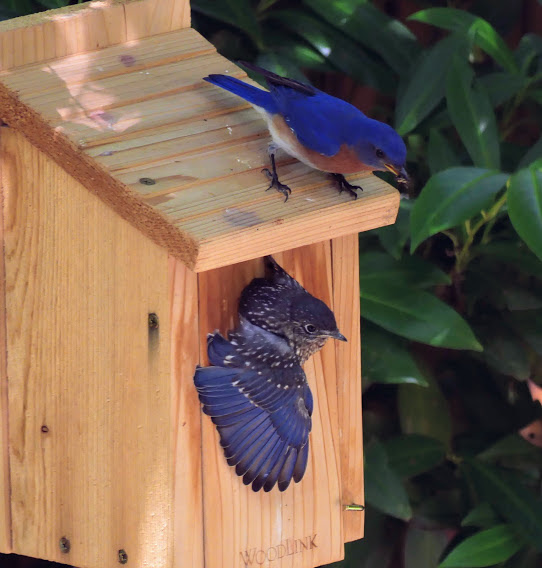
Robin believes the most satisfying volunteer work involves teamwork like that described above. Having spent much of her adult life outside the United States, she notes that she lacked information about the volunteer world when she moved to Virginia a few years ago. “Becoming a Fairfax Master Naturalist in 2017 and volunteering with the regional Audubon Society of Northern Virginia and local Environmental Advisory Committee wired me into great networks and has helped me figure out how best to use my skills for a mix of ‘what needs to be done’ and ‘pure pleasure’ volunteer service,” she says.
What’s in that “pure pleasure” category? “Anything involving birds,” Robin tells me. “It’s time to start monitoring bluebird nest-boxes again and happily, the paths to them are dirt.”


